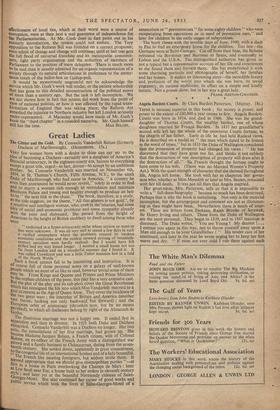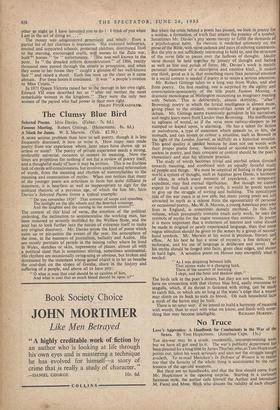Angela Burdett - Coutts. By Clara Burdett Patterson. (Murray. 18S.) THERE is
unusual material in this book ; for money is power, and power to the extent of £80,000 a year comes to few. Angela Burdett- Coutts was born in 1814, and died in 1906. She was the grand- daughter of Thomas Coutts, the wealthy banker, one of whose daughters married Sir Francis Burdett. In 1837 her grandfather's second wife left her the whole of the enormous Coats fortune, to the chagrin of her father. Early in life he had held Radical views, He is described on a medal as " the man which dared to be honest in the worst of times," but in 1833 the Duke of Wellington considered that the possession of property had changed his views : " He has discovered that they have gone too far, and thinks it not unlikely that the destruction of one description of property will draw after it the destruction of all." Sir Francis thought the fortune ought to have come to his wife. (There was no Married Women's Property Act.) With the quiet strength of character that she showed throughout life, Angela left home. She took with her as chaperon her gover- ness who, whether as Miss Meredith or later as Mrs. Brown, remained with her till death. It was not till then that Angela married.
Her great-niece, Mrs. Patterson, tells us that it is impossible to write a " full-dress biography " because so much has been destroyed. Perhaps that is why the book is tantalising. Not only is the material incomplete, but the arrangement and comment are not• as illuminat- ing as they might have been. Nevertheless there is much of inter- est. There are letters from Dickens, Rajah' Brooke of Sarawak, Sir Henry Irving and others. Those from the Duke of Wellington are the most personal. They begin in 1839, and in 1847 marriage is discussed. The Duke writes, " You are Young I My dearest I . I entreat you again in this way, not to throw yourself away upon a Man old enough to be your Grandfather ! " His tender care of her continued, and later in the year he wrote urging her to keep her feet warm and dry. " If mine are ever cold I rub them against each other at night as I have intreated you to do ! I think of you when I am in the act of doing so...."
The money was administered generdusly and wisely. Even a partial list of her charities is impressive. She endowed bishoprics, erected and supported schools, protected children, distributed food to the starving, encouraged crafts, sent nurses to the Zulu war, built " homes " `or " unfortunates. ' She was well known to the poor. In " the dreaded reform demonstration " of 1866, twenty thousand men passed through the streets in procession, and when they came to her house they " caught a glimpse of her well-known face " and raised a shout. Each line took up the cheer as it came abreast. For three hours it continued. It was " a people's ovation to Miss Coutts."
In 1871 Queen Victoria raised her to the peerage in her own right. Edward VII once described her as " after my mother the most remarkable woman in the kingdom." They were the only two women of the period who had power in their own right.
HELEN FITZRANDOLPLI.



































 Previous page
Previous page